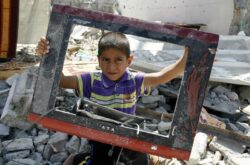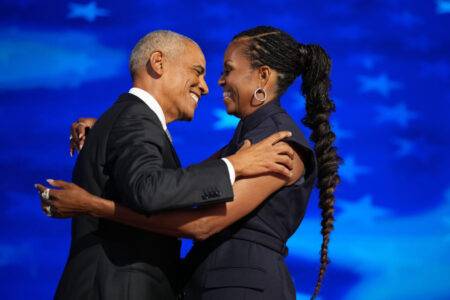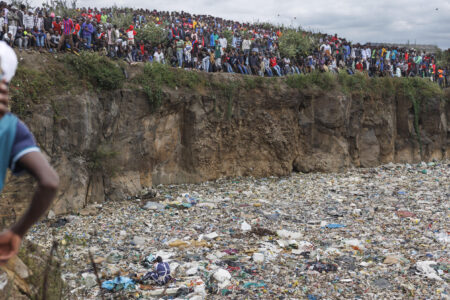There must have been a quick re-working of the Pope’s Easter message as news emerged of the death toll from Gaza’s Bloody Friday when the Israeli military massacred 16 Palestinian peace activists.
For while calling for peace in the Holy Lands he made a direct reference to the violence on Friday making the point that the conflict in Palestine “does not spare the defenceless“. From the central balcony of St Peter’s Basilica in Rome he was addressing tens of thousands who had gathered in the square below where he had earlier celebrated mass.
Referring directly to Bloody Friday he urged the need for “reconciliation for the Holy Land, also experiencing in these days the wounds of ongoing conflict that do not spare the defenceless”. It was, in all, a bleak message or “Urbi et Orbi” – to the city and the world – as he referred to the “carnage” in Syria, calling for humanitarian aid to be allowed to enter the country. South Sudan and the Democratic Republic of Congo were also name checked as countries where peace was much needed.
As he made his annual address for Easter, the Syrian army had just regained most of the towns and villages in eastern Ghouta causing tens of thousands of people to flee the towns in the suburbs east of the capital Damascus.
Pope Francis also called for international assistance for Venezuela, so that more people would not have to abandon their homeland because of the economic and political crisis unfolding in his native South America.
Turning towards the Korean peninsula, he also prayed that peace would be advanced from the “fruits of dialogue” as both North and South prepare to hold their first summit in more than a decade on April 27, after the North Korean leader, Kim Jong-un, pledged his commitment to denuclearisation.
Referring to “so many acts of injustice” in the world, Pope Francis added that he wanted hope and dignity to overtake the regions of deprivation, exclusion, hunger and unemployment. He was critical of the treatment of the world’s migrants and refugees as well as victims of organised crime including the drug trade, human trafficking and modern day slavery.
However, while his traditional address is always global in content, it was quite clear Tel Aviv was not listening as Israel’s defence minister rejected calls for an inquiry into Friday’s massacre of Palestinians. tens of thousands in Gaza had mobilised for the start of a six-week campaign by Palestinians to highlight their right to return, under international law, to their lands.
In fact while the hawkish Avigdor Lieberman not only predictably rejected criticism of Israel’s actions he said his soldiers “deserve a medal.” He also dismissed UN secretary general António Guterres and Federica Mogherini, the European Union’s foreign policy chief, as well as other leaders calls for an independent investigation into what happened near the Israeli border with Gaza.
As I listened to Australian-born Mark Regev regale BBC Radio 4’s Today programme with the details, I gasped in wonderment at his description of Hamas terrorists using the good people of Gaza as human shields while threatening the citizens of Israel as they headed towards the fence. it all sounded plausible … on radio but a quick look at the TV news, Youtube videos and camera footage on smart phones reveals tel Aviv’s man in London plays with the truth.
For a starter the concrete Apartheid Wall is NOT a fence, Mr Regev. Words are my trade, I’ve been a journalist for 40 years and I’ve seen the Apartheid Wall with my own eyes – it is not a fence! Secondly there were no Hamas gunmen, Hamas flags or Hamas orchestrated human shields … the world’s media were in Gaza that day looking for exactly such evidence and found none! Thirdly this was an act of peaceful resistance and the only weapons were those used by Israeli soldiers.
The truth is very simple: Israel does not want the world to know that the UN recognised decades ago that the Palestinians have every right under international law to return to their land. On Friday, the Palestinians themselves adopted Gandhi-style peaceful resistance to gather together and make that point clear.
Despite attempts by some pro-Israel lobby groups in Britain to cast the march as a Hamas, and therefore “terrorist”, inspired protest, it was actually a grassroots initiative which had the support of all of the Palestinian factions, including Hamas, Fatah, the Popular Front for the Liberation of Palestine (PFLP) and Islamic Jihad. While the protest in Gaza is expected to continue daily until May 15 and the 70th anniversary of the Naqba — the Catastrophe of the creation of Israel — the message is very simple: Palestinians have a legitimate right of return to their pre-1948 homes and land.
What happened on Friday was a PR disaster on a monumental scale for Israel and to have the Pope lead the criticism during his Easter address should be recognised by those in Tel Aviv who think they can slaughter peaceful protestors and get away with it. Perhaps this is just one massacre too many for the rest of the world to stomach.
Far from hiding away, Palestinians will continue with their Ghandi-style action infant of the world’s cameras for the next six weeks. the people of Gaza might be cut off from the world in terms of water, electricity and basic aid but what they’re not short of is courage … that is in their DNA. Viva, viva Palestina!
[simple-payment id=”8065″]






